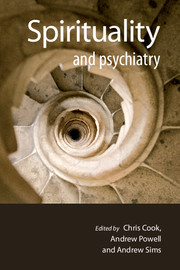Book contents
- Frontmatter
- Contents
- List of contributors
- List of tables, boxes and figures
- Foreword
- Preface
- The Spirituality and Psychiatry Special Interest Group of the Royal College of Psychiatrists
- 1 Spirituality in psychiatry
- 2 Assessing spiritual needs
- 3 Psychosis
- 4 Suicide
- 5 Child and adolescent psychiatry
- 6 Psychotherapy
- 7 Intellectual disability
- 8 Substance misuse
- 9 Neuroscience of the spirit
- 10 Spiritual care in the NHS
- 11 The transpersonal perspective
- 12 Religion and religious experiences
- 13 Pathological spirituality
- 14 Ageing
- Index
6 - Psychotherapy
Published online by Cambridge University Press: 02 January 2018
- Frontmatter
- Contents
- List of contributors
- List of tables, boxes and figures
- Foreword
- Preface
- The Spirituality and Psychiatry Special Interest Group of the Royal College of Psychiatrists
- 1 Spirituality in psychiatry
- 2 Assessing spiritual needs
- 3 Psychosis
- 4 Suicide
- 5 Child and adolescent psychiatry
- 6 Psychotherapy
- 7 Intellectual disability
- 8 Substance misuse
- 9 Neuroscience of the spirit
- 10 Spiritual care in the NHS
- 11 The transpersonal perspective
- 12 Religion and religious experiences
- 13 Pathological spirituality
- 14 Ageing
- Index
Summary
We live in succession, in division, in parts, in particles. Meantime within man is the soul of the whole; the wise silence; the universal beauty, to which every part and particle is equally related, the eternal ONE. And this deep power in which we exist and whose beatitude is all accessible to us, is not only self-sufficing and perfect in every hour, but the act of seeing and the thing seen, the seer and the spectacle, the subject and the object, are one. We see the world piece by piece, as the sun, the moon, the animal, the tree; but the whole, of which these are shining parts, is the soul.
Ralph Waldo Emerson, ‘The Over-Soul’, Ninth Essay (1841)For many doctors, let alone the general public, the relationship of psychiatry to psychotherapy is a source of confusion. When is emotional disturbance a sign of a mental illness requiring drug treatment? When is it a problem that can be resolved through discussion and discovering how it arose? When is it a mixture of the two? And what is best done about it? People seeking help are often directed to psychiatrists, psychologists, psychotherapists, or counsellors without understanding either the range of options available to them or the rationale for consulting one rather than the other.
Spiritual concerns are regarded with even less clarity. Where there is a core religious problem and the person belongs to an established faith tradition, the priest, imam, rabbi or appropriate spiritual advisor is likely to become involved. However, for people who do not belong to a religious community or faith tradition there are no guidelines; the healthcare practitioner may or may not be personally interested in the patient's spiritual reality. In addition, psychiatrists working with a medical model of mental illness are likely to see spiritual issues as beyond their competence and many psychotherapists prefer to stick specifically to psychological objectives.
Yet some psychiatrists and psychotherapists do see the importance of addressing spiritual concerns, either because they intuitively recognise this to be an essential part of treating the ‘whole’ person or because they have undergone training in therapy that values this dimension of human life.
- Type
- Chapter
- Information
- Spirituality and Psychiatry , pp. 101 - 121Publisher: Royal College of PsychiatristsPrint publication year: 2009



